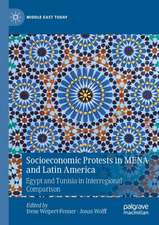The Palgrave Handbook of Development Cooperation for Achieving the 2030 Agenda: Contested Collaboration
Editat de Sachin Chaturvedi, Heiner Janus, Stephan Klingebiel, Xiaoyun Li, André de Mello e Souza, Elizabeth Sidiropoulos, Dorothea Wehrmannen Limba Engleză Hardback – 30 noi 2020
Preț: 907.71 lei
Preț vechi: 997.49 lei
-9% Nou
Puncte Express: 1362
Preț estimativ în valută:
173.71€ • 177.90$ • 144.50£
173.71€ • 177.90$ • 144.50£
Carte disponibilă
Livrare economică 21-27 februarie
Livrare express 08-14 februarie pentru 98.61 lei
Preluare comenzi: 021 569.72.76
Specificații
ISBN-13: 9783030579371
ISBN-10: 3030579379
Pagini: 730
Ilustrații: XXXII, 730 p. 34 illus., 21 illus. in color.
Dimensiuni: 155 x 235 mm
Greutate: 1.3 kg
Ediția:1st ed. 2021
Editura: Springer International Publishing
Colecția Palgrave Macmillan
Locul publicării:Cham, Switzerland
ISBN-10: 3030579379
Pagini: 730
Ilustrații: XXXII, 730 p. 34 illus., 21 illus. in color.
Dimensiuni: 155 x 235 mm
Greutate: 1.3 kg
Ediția:1st ed. 2021
Editura: Springer International Publishing
Colecția Palgrave Macmillan
Locul publicării:Cham, Switzerland
Cuprins
Foreword (Jorge Chediek).-
Chapter 8: Should China join the GPEDC? The prospects for China and the Global Partnership for Effective Development Co-operation
Domestic:
Introduction : Contestation and Collaboration: Effective Development Cooperation for Achieving the 2030 Agenda.-
Section 1: Changing Context of Development Cooperation - Current Narratives and Trends
Chapter 1: An evolving shared concept of Development Cooperation (Milindo Chakrabarti and Sachin Chaturvedi, Research and Information System for Developing Countries, India).-
Chapter 2: The globalisation of foreign aid: Global influences and the diffusion of aid priorities (Liam Swiss, Memorial University).-
Chapter 3: Southernization of OECD’s ODA approach (Paulo Esteves, BRICS Policy Center, Brazil / Stephan Klingebiel, DIE).-
Chapter 4: Conceptualising ideational convergence of Chinese and “Western” aid (Heiner Janus, DIE / Tang Lixia, China Agricultural University).-
Section 2: Global Development Norms and Institutional Architecture - Points of Convergence and Divergence
Chapter 5: How to govern a global development cooperation regime?
(André de Mello e Souza, Institute for Applied Economic Research, Brazil).-
Chapter 6: The position of development policy: a functional definition
(Adolf Kloke-Lesch, Sustainable Development Solutions Network Germany).-
Chapter 7: The past and future of the emerging economies and the GPEDC: points of convergence and divergence (Gerardo Bracho, Centre for Global Cooperation Research).-
(Qi Gubo, China Agricultural University / Li Xiaoyun, China Agricultural University).-
Section 3: Measurements of Development Cooperation - Frameworks and Theories for Assessments: Development Cooperation
Chapter 9: ‘From billions to trillions’: Measuring financing the SDGs in a world ‘beyond aid’ (Emma Mawdsley, University of Cambridge).-
Chapter 10: Future of the GPEDC Monitoring Framework (Debapriya Bhattacharya, Centre for Policy Dialogue).-
Chapter 11: Monitoring and evaluation in South-South Cooperation: the case of CPEC in Pakistan (Murad Ali, DIE).-
Chapter 12: African civil society organizations: Monitoring and Evaluation of CSO programmes (Fanwell Kenala Bokosi, AFRODAD).-
Section 4: Multi-level perspectives on development cooperation for achieving the SDGs
Chapter 13: South Africa’s changing role in development structures: Being in them but not of them (Elizabeth Sidiropoulos, South African Institute of International Affairs (SAIA).-
Chapter 14: India’s approach to development cooperation (Anthea Mulakala, The Asia Foundation).-
Chapter 15: The SDGs, multilateral development organisations and maximsing the impact of U.S. development assistance (Anthony Pipa, Brookings).-
Chapter 16: A middle way towards development cooperation: Foreign aid discourse of South Korea and Turkey in relation to the OECD DAC
(Melis Baydag, Ruhr University Bochum).-
Chapter 17: Malawi: a micro-cosm of the new development finance architecture (Neissan Besharati, Institute for Global Dialogue, South Africa).-
Chapter 18: The role of development cooperation in new national planning in Least Developed Countries (Admos Chimhowu, University of Manchester / David Hulme, University of Manchester).-
Triangular Cooperation:
Chapter 19: Achieving the SDGs through triangular cooperation/South-South cooperation on climate change: Germany-China-Ethiopia (Moritz Weigel, The ChinaAfricaAdvisory / Alexander Demissie, The ChinaAfricaAdvisory).-
Chapter 20: India as a Partner in Triangular Development Cooperation: Prospects for the India-UK Partnership for Global Development (Sebastian Paulo, Observer Research Foundation India).-
Non-State Actors:
Chapter 21: The changing role of the private sector for development cooperation (Jorge A. Pérez Pineda, Anáhuac University / Dorothea Wehrmann, DIE).-
Chapter 22: The Changing Role of the Private Sector in South-South Co-operation: The Cases of Kenya and Uganda (Vitalice Meja, Reality of Aid Africa Network).-
Conclusion: What Future for Development Cooperation? Prospects and key messages for BAPA+40 and beyond
Notă biografică
Sachin Chaturvedi is Director General at the Research and Information System for Developing Countries (RIS), a New Delhi, India-based think tank.
Heiner Janus is a researcher in the Inter- and Transnational Cooperation programme at the German Development Institute.
Stephan Klingebiel is Chair of the Inter- and Transnational Cooperation programme at the German Development Institute and Senior Lecturer at the University of Marburg, Germany.
Xiaoyun Li is Chair Professor at China Agricultural University and Honorary Dean of the China Institute for South-South Cooperation in Agriculture. Prof. Li is the Chair of the Network of Southern Think Tanks and Chair of the China International Development Research Network.
André de Mello e Souza is a researcher at the Institute for Applied Economic Research (IPEA), a Brazilian governmental think tank.
Elizabeth Sidiropoulos is Chief Executive of the South African Institute of International Affairs. She has co-edited Development Cooperation and Emerging Powers: New Partners or Old Patterns (2012) and Institutional Architecture and Development: Responses from Emerging Powers (2015).
Dorothea Wehrmann is a researcher in the Inter- and Transnational Cooperation programme at the German Development Institute.
Heiner Janus is a researcher in the Inter- and Transnational Cooperation programme at the German Development Institute.
Stephan Klingebiel is Chair of the Inter- and Transnational Cooperation programme at the German Development Institute and Senior Lecturer at the University of Marburg, Germany.
Xiaoyun Li is Chair Professor at China Agricultural University and Honorary Dean of the China Institute for South-South Cooperation in Agriculture. Prof. Li is the Chair of the Network of Southern Think Tanks and Chair of the China International Development Research Network.
André de Mello e Souza is a researcher at the Institute for Applied Economic Research (IPEA), a Brazilian governmental think tank.
Elizabeth Sidiropoulos is Chief Executive of the South African Institute of International Affairs. She has co-edited Development Cooperation and Emerging Powers: New Partners or Old Patterns (2012) and Institutional Architecture and Development: Responses from Emerging Powers (2015).
Dorothea Wehrmann is a researcher in the Inter- and Transnational Cooperation programme at the German Development Institute.
Textul de pe ultima copertă
This open access handbook analyses the role of development cooperation in achieving the 2030 Agenda in a global context of ‘contested cooperation’. Development actors, including governments providing aid or South-South Cooperation, developing countries, and non-governmental actors (civil society, philanthropy, and businesses) constantly challenge underlying narratives and norms of development. The book explores how reconciling these differences fosters achievement of the Sustainable Development Goals.
Sachin Chaturvedi is Director General at the Research and Information System for Developing Countries (RIS), a New Delhi, India-based think tank.
Heiner Janus is a researcher in the Inter- and Transnational Cooperation programme at the German Development Institute.
Stephan Klingebiel is Chair of the Inter- and Transnational Cooperation programme at the German Development Institute and Senior Lecturer at the University of Marburg, Germany.
Xiaoyun Li is Chair Professor at China Agricultural University and Honorary Dean of the China Institute for South-South Cooperation in Agriculture. Prof. Li is the Chair of the Network of Southern Think Tanks and Chair of the China International Development Research Network.
André de Mello e Souza is a researcher at the Institute for Applied Economic Research (IPEA), a Brazilian governmental think tank.
Elizabeth Sidiropoulos is Chief Executive of the South African Institute of International Affairs. She has co-edited Development Cooperation and Emerging Powers: New Partners or Old Patterns (2012) and Institutional Architecture and Development: Responses from Emerging Powers (2015).
Dorothea Wehrmann is a researcher in the Inter- and Transnational Cooperation programme at the German Development Institute.
Heiner Janus is a researcher in the Inter- and Transnational Cooperation programme at the German Development Institute.
Stephan Klingebiel is Chair of the Inter- and Transnational Cooperation programme at the German Development Institute and Senior Lecturer at the University of Marburg, Germany.
Xiaoyun Li is Chair Professor at China Agricultural University and Honorary Dean of the China Institute for South-South Cooperation in Agriculture. Prof. Li is the Chair of the Network of Southern Think Tanks and Chair of the China International Development Research Network.
André de Mello e Souza is a researcher at the Institute for Applied Economic Research (IPEA), a Brazilian governmental think tank.
Elizabeth Sidiropoulos is Chief Executive of the South African Institute of International Affairs. She has co-edited Development Cooperation and Emerging Powers: New Partners or Old Patterns (2012) and Institutional Architecture and Development: Responses from Emerging Powers (2015).
Dorothea Wehrmann is a researcher in the Inter- and Transnational Cooperation programme at the German Development Institute.
Caracteristici
Analyzes international development cooperation for achieving the United Nations 2030 Agenda
Contributes to a new framing of development cooperation in a fundamentally shifting system of development cooperation
Examines an evolving academic and policy-related debate on the increasingly disruptive nature of development cooperation
Contributes to a new framing of development cooperation in a fundamentally shifting system of development cooperation
Examines an evolving academic and policy-related debate on the increasingly disruptive nature of development cooperation

















